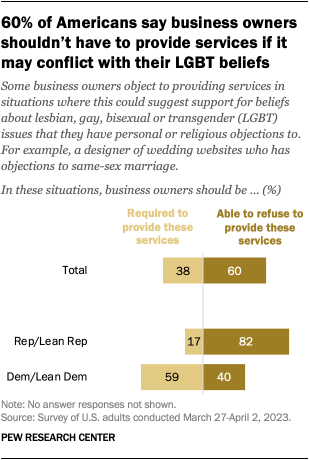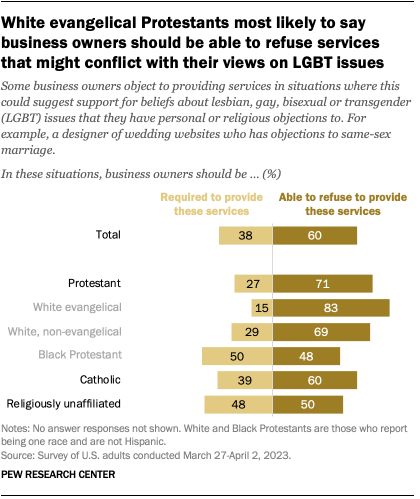
A majority of Americans think business owners should be able to refuse to provide services in situations where providing them may “suggest support for beliefs about lesbian, gay, bisexual or transgender (LGBT) issues” to which they have personal or religious objections, according to a new Pew Research Center survey.
Pew Research Center conducted this analysis to provide insight into Americans’ views about a prominent issue currently before the U.S. Supreme Court. We surveyed 5,079 adults from March 27 to April 2, 2023. Everyone who took part in this survey is a member of the Center’s American Trends Panel (ATP), an online survey panel that is recruited through national, random sampling of residential addresses. This way nearly all U.S. adults have a chance of selection. The survey is weighted to be representative of the U.S. adult population by gender, race, ethnicity, partisan affiliation, education and other categories. Read more about the ATP’s methodology.
Here are the questions used for the report, along with responses, and its methodology.
In earlier surveys, the public has expressed positive views of the impact of legalization of same-sex marriage and broad support for policies aimed at preventing discrimination against transgender Americans.

But in a question reflecting the arguments in a pending Supreme Court case, 60% of Americans think business owners should not have to provide services if it might signal support for beliefs on LGBT issues that they oppose, according to the survey conducted in early April. Around four-in-ten (38%) say business owners should be required to provide services in these situations.
The Supreme Court case centers on a challenge to Colorado’s public accommodations law by website designer Lorie Smith, who says the law violates her right to freedom of speech by requiring her to design wedding websites for same-sex couples.
The oral arguments in the case highlighted the competing rights at issue. Smith’s attorney said her client’s complaint is based on the message being conveyed by her work, not the customers who may be affected. However, Colorado’s solicitor general said that by ruling in favor of Smith, the court would undermine the state’s accommodations law and open the door to discrimination because of a person’s race or religion, in addition to their sexual or gender identity.
The survey question does not ask whether business owners should have the right to discriminate against lesbian, gay, bisexual or transgender people. Rather, it asks whether business owners who object to providing services that could suggest beliefs on LGBT issues – such as a “designer of wedding websites who has objections to same-sex marriage” – should be required to provide these services or be able to refuse to do so.
Views by party, religion

As with opinions on same-sex marriage and transgender issues, there is a wide partisan gap in views of whether business owners should be able to refuse to provide services if it conflicts with their views on LGBT issues. Republican and Republican-leaning independents overwhelmingly side with business owners who object to providing services in these situations (82% vs. 17%). By a smaller margin (59% to 40%), Democrats and Democratic leaners say business owners should have to provide services in these cases.
Opinions also differ by religious affiliation. For example, while 83% of White evangelical Protestants say business owners should be able to deny services in situations where it could conflict with their beliefs, just half of religiously unaffiliated adults say the same.
Note: Here are the questions used for the report, along with responses, and its methodology.





